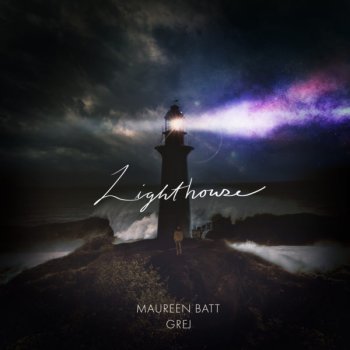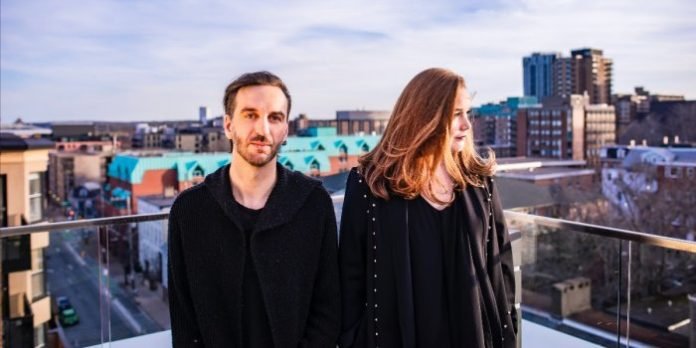Created from letters and journals written on a journey through grief, Halifax soprano Maureen Batt and Toronto-based percussionist and composer Grej (Greg Harrison) have released Lighthouse through Halifax-based label Leaf Music.
A mix of classical and electronic genres that utilize voice, piano, harmonium, synthesizer, and field recordings, we learn more about the nine-track album from the two artists in this Q&A.
Lighthouse is now available for digital download. Visit leaf-music.ca purchase it on your favourite platform.
This interview has been edited.
Lighthouse was “created from letters and journals written on a journey through grief.” Can you tell us more about the inspiration?
These journals served as inspiration for the album in numerous ways. Some of the text served as our “libretto” for some pieces. Other entries merely inspired what the particular piece was about. Other words were pulled from various letters and formed into a song. ~G
The album is described as “a marriage between classical and electronic genres.” Why this mix of genres for Lighthouse?
From my perspective, that’s just who we are as artists. This marriage of genres came out naturally. We were both open to whatever style would best fit the moods and themes we were trying to convey. ~M
I always strive to cross genres in my music. It’s something that always interests me and challenges me in new ways each time. This project seemed like a natural fit, with both of us having classical/contemporary music backgrounds. I see it as an opportunity to explore a new medium and find a balance that works. ~G
Why this album now?

This project started with a conversation between me and my brother-in-law, Tom. He asked me what I thought my next album would be after Lady of the Lake, for which he did my music videos, album art, and photography. I said I was thinking about a commission involving letters. And he wondered if I would ever do something with his letters to his late wife. I responded by saying I’d be honoured to work with that text and inspiration, and I wanted to bring on a composer to work with. We both instantly thought of Grej.
We gave it some time to settle in as a concept. Then within a few months, we were applying for funding. We had to wait a while after getting our funding before figuring out the logistics of getting together because of the pandemic. We were able to create/record in April. I feel like no time would feel like the right time for this project, and any time was the right time. ~M
Why Lighthouse for the album’s title?
We picked the title about halfway through our creation/recording week. Tom talked a lot about the symbolism of the lighthouse: the light and the dark, the light IN the dark, a beacon of light, safety, and an island where you’re lost at sea. Greg and I loved the idea of this offering of safety and hope, and guidance. When we were brainstorming titles, this came up and immediately felt right. ~M
How did you and Grej come to collaborate on this album?
Greg and Tom went to school together and have remained close. Professionally Tom has supported both me and Greg on many of our artist endeavours, so he is very familiar with our work. This collaboration was a natural fit for many reasons, even though we had never worked together before. Specifically, it made sense for the two of us, both close to Tom and Ashley, to create this work together. ~M
Tell us about the creative process.
For this project, I decided not to pre-compose too much music in advance. I really wanted to create an environment where we could freely create together on the spot. There were loose themes/ sketches which we built upon and experimented with.
Some pieces such as “Come Find Me in a Dream” and “Love You Forever Plus a Day” use an element of indeterminacy. I sketched out text/pitches but allowed freedom for rhythmic phrasing. To me, this allowed Maureen to sing and feel the melodies in her own way in that particular moment.
There was a lot of experimenting with Maureen’s voice. A rule I made for myself going into this project is to explore her instrument as much as I could before defaulting to the electronic instrumentation that I’m accustomed to. In “Pieces of You” and “Hope on Ice,” I reverse-engineered her voice to sound more like a synthesizer. ~G
I was ready for anything. Greg and I knew of each other from the Toronto/East Coast music community. We had never worked together but were familiar with one another’s work. When we got together in March 2020 to do a couple of demos, I was delighted (though not surprised) to find that we had a very natural collaboration rhythm.
When we spent the week together in April making the album, we quickly found this same ease. I wanted to make myself available to Greg for however my instrument was needed. I thoroughly enjoyed the process of collaborating, getting to really play and improvise, all the while feeling safe with him in the composer’s chair. ~M
Is Lighthouse a departure from the music you and Grej usually create, or will fans recognize it as your music?
There are definitely many moments where people will hear my voice in the ways they’ve heard it before on other recordings or in other performances of Western classical contemporary music. But there are also many places where I use my voice in different styles/textures/colours that I think people will hear as a departure from my other body of work published commercially. ~M
Most of my albums are conceptual and eclectic, so I wouldn’t say it’s necessarily a departure for me. However, this was the first time collaborating with a classically trained soprano, let alone a vocalist. My compositions tend to be quite emotional, which explores the beauty in chaos. I think the nature of this album, a journey of grief, love/ loss, was a natural fit for me. ~G
What will surprise listeners most about the album?
I think from the perspective of my voice, it might surprise people to hear the colours I use in some songs. And even just the range I’m singing in — as a soprano, people are used to hearing me sing higher than I do in a lot of this album. I also feel like each piece has its own style, which might surprise the listener. ~M
There was an unconventional approach taken in recording this album/ Maureen’s voice. Typically her genre would be recorded in a big beautiful cathedral which would have rich reverberations to her voice. I wanted this album to feel more intimate and disparate.
I think some of the pieces will surprise some listeners as the electronics are more in the driver’s seat. ~G
Why should someone buy the album?
We hope that anyone who has experienced the loss of someone close to them will find a personal connection to this album. We hope this album offers you joy, healing, and love! ~M
I truly believe everyone can find something within Lighthouse that resonates with them. Though a personal loss of ours inspired this album, its message is universal. Grief is a complex journey, and we hope this album can hold you through that. ~G


